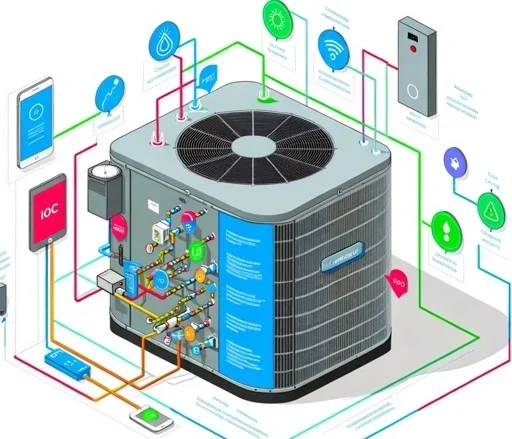

As we continue in 2024, the HVAC industry is seeing an influx of new technologies that are changing the way we approach heating and cooling systems. These new technologies are becoming increasingly popular, and HVAC contractors must be prepared to adapt to the changing landscape.
Two of these new technologies that are becoming more popular include smart HVAC technology and energy-efficient HVAC systems, and HVAC contractors should know about what they are and when to use them.
Smart HVAC systems are becoming more common, with features like remote monitoring and control, energy efficiency tracking, and predictive maintenance. These systems are designed to be more energy-efficient and easier to manage, making them a popular choice for homeowners and businesses.
Remote monitoring and control allow property owners and facility managers to adjust their HVAC systems remotely, making it easy to control a building’s temperature and humidity levels from anywhere. This feature is particularly useful for holidays and weekends when companies decide to work since it’s easy to reset the t-stats remotely.
Today, remote monitoring and control goes beyond just temperature. Many systems can track humidity, water leaks, motor vibrations, voltage, line pressures, and more. There are a variety of bases and sensors that can be installed to monitor these critical functions.
Keep in mind that access to the internal is critical to the success of monitoring and control. You have two choices – WiFi or cellular access. If WiFi coverage is spotty or overloaded by tenant traffic, you may want to consider cellular. The other decision is directly wiring the automation system or using Wifi. Using Cat-5 or Cat-6 will always be faster and more reliable but sometimes running wire can be difficult or cost prohibitive.
Lastly, don’t forget about a battery back-up system for your automation system. Some systems will store information gathered during an outage and then upload it once power is restored.
Energy efficiency tracking is another popular feature of smart HVAC technology. These systems can track energy usage in real-time, allowing property owners and facility managers to identify areas where they can save on energy costs. This can be particularly useful for businesses that want to reduce energy bills and become more sustainable.
Smart HVAC technology uses a sophisticated algorithms that uses performance data to improve. Instead of relying on the thermostat, many manufacturers now have this technology built into their high efficiency heating and cooling systems that you can access remotely.
Predictive maintenance is becoming increasingly popular in the HVAC industry as it provides a proactive approach to system maintenance. With the help of sensors and algorithms, smart HVAC systems can detect and diagnose potential issues before they become more severe problems. HVAC contractors can then perform maintenance and repairs before any significant damage is caused, preventing unexpected breakdowns and the need for costly emergency repairs.
This proactive approach can save businesses significant amounts of money by extending the life of their HVAC equipment, making them more efficient and reliable, and reducing costly repairs that could’ve been avoided.
As the popularity of smart HVAC technologies continues to grow, HVAC contractors will see an increase in demand for these systems. Special sensors and algorithms can find and fix problems before they get worse. This means that someone can come and fix it before it breaks down and costs a lot of money to fix.
Consider investing in training, tools, and equipment to capitalize on this growing trend.
Energy efficiency is a growing priority for many facilities and businesses, and HVAC systems significantly contribute to energy usage. As a result, HVAC contractors may see an increase in demand for more energy-efficient systems.
High-performance HVAC installation is a great way to improve the energy efficiency of your HVAC system. By improving on HVAC systems that are currently installed, HVAC contractors can improve the energy efficiency of already installed systems by retrofitting them and providing a better HVAC experience for your clients.
One key metric used to measure the energy efficiency of HVAC technologies is the Seasonal Energy Efficiency Ratio (SEER). This rating can measure the system’s cooling output throughout the cooling season, divided by the energy used in watt-hours. Systems with higher SEER ratings are more energy-efficient, meaning they use less energy to cool a given space.
Another critical feature of energy-efficient HVAC systems is variable-speed motors. These motors can adjust their speed based on the cooling or heating needs of the space, allowing the system to operate more efficiently and reduce energy usage. This can be particularly useful in large commercial areas, where cooling needs may vary throughout the day.
As the demand for energy-efficient HVAC systems continues to grow, HVAC contractors may need to invest in new equipment and tools to meet this demand. And staying up-to-date on the latest energy efficiency regulations and standards is critical of HVAC contractors to ensure they can provide their customers with the most efficient systems possible.
New technologies are a constant for the HVAC industry, so it is essential to understand what they are and how you can incorporate them into your business and offer installations of them. Learning about new technologies may seem complicated or out of reach, but understanding the technology and what to use it for could be a new offering for your business.
HVAC contractors can benefit from knowing about new technologies that are becoming available and on the horizon. Smart HVAC systems and energy-efficient HVAC systems are just two examples of the latest technologies that contractors should prepare for.
HVAC contractor looking to stay ahead of the curve can rely on Raiven to keep them informed and make sure they have access to the latest in products, equipment, supplies and more. And the Raiven procurement platform provides regular savings from 7-30% and a centralized Raiven Marketplace to save you time and money. Check out Raiven for HVAC Contractors to learn more.
